Читать книгу Introduction to Experimental Linguistics - Sandrine Zufferey - Страница 22
1.4. Advantages and disadvantages of experimental linguistics
ОглавлениеSo far, we have shown how experimental linguistics is set within the scientific process and involves the use of quantitative methodology for studying language. On the basis of these principles, the results from studies in experimental linguistics are considered representative and can be generalized, unlike those from studies based on a qualitative methodology. The possibility of generalizing results is one of the strong points of research in experimental linguistics. However, this approach has a less positive corollary. Due to its empirical and quantitative nature, experimental linguistics needs to measure the linguistic phenomena it intends to study. While this can be relatively simple in some cases, the operationalization of complex processes (let us consider language comprehension, for example) implies the decision to observe certain indicators which could, at some point, not exactly measure what is desired. This issue will be discussed in more detail in Chapter 2. For now, it is important to keep in mind that just because something can be measured, this does not necessarily make it valid or reliable. Conclusions drawn on the basis of inadequate measures may not correspond to reality and may therefore lead to erroneous generalizations.
We have also seen repeatedly throughout this chapter, that experimental linguistics aim to identify the variables, also called factors, which can influence linguistic processes. For this, it is necessary to establish causal relations between variables by manipulating them. In this respect, experimental linguistics differs from another quantitative method, corpus linguistics, which aims to observe linguistic phenomena on the basis of natural data. While corpus linguistics can only account for a relation between some variables, experimental linguistics also makes it possible to explain the reasons underlying such connections between variables. These two methods are considered complementary, since they take place at different stages of the research process. Implementing a corpus study makes it possible to explore data and to uncover relationships between variables, relationships which can later be investigated experimentally, based on the hypotheses formulated as a result of data observation.
One of the prerequisites for establishing a cause and effect relationship between two variables, is the control of the conditions in which these variables are manipulated, as well as the identification of all the external variables that could influence the results. This necessity has the advantage of enabling solid conclusions as to the relationship between the variables, but risks keeping the experiment too far from reality. In certain comprehension experiments, such as reading tasks, for example, the sentences are presented word by word in order to measure the time allotted to each word. This way of reading differs enormously from natural reading conditions, where it is notably possible to go back in the text. For these reasons, experimental studies may lack ecological validity and not be completely generalizable.
This need for control also implies that each experiment can only investigate a specific hypothesis, in which every variable is operationalized in a certain way. For this reason, a specific experiment can only respond to a narrow research question. It is therefore essential to conduct a lot of different experiments to arrive at the comprehension of a phenomenon. Knowledge can then be built on the accumulation of experimental research related to such a phenomenon.
Beyond these limitations, the experimental methodology is a very important tool for linguistics, as it makes possible to study almost any research hypothesis. When linguistic phenomena are very rare or hardly accessible to the consciousness, it becomes essential for the construction of knowledge about these phenomena.
